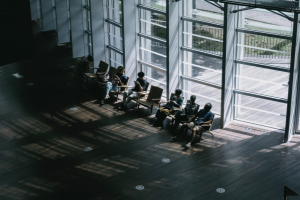Music is key in many subcultures—it unites, energizes, and creates shared experiences. Whether it’s at a festival, a club, or just singing lyrics out loud in the car with friends, music is often a social affair. But here’s the thing, even when you’re alone, rocking out to your favorite song in your room or vibing to a playlist on a solo road trip, it can still be a deeply social experience. Sounds counterintuitive right?
Age of Solitude
We are living in the Age of Solitude—a time wherein people are spending more time alone than ever before (we wrote about this here.) But being alone doesn’t necessarily mean being lonely. The way we consume media, interact online, and even listen to music has evolved. Our solitary experiences are still rich with connection—we just experience them in a different way.
Listening as social experience
A recent study, featured in Futurity, sheds light on how listening to music alone can still be a social experience. Researchers found that music has a unique way of making us feel connected, even when no one else is around thanks to parasocial relationships—one-sided emotional bonds between fans and artists. A recent study featured in Futurity highlights how music fosters connection even in solitude. Through memory, shared fan culture, and emotional resonance, the simple act of pressing play can transport us to a shared space—whether that’s recalling a concert moment, feeling in sync with an artist, or bonding over lyrics with an online community.
When we listen to our favorite songs, we engage in three key social surrogate pathways:
- Parasocial bonds – Listeners feel personally connected to artists, as if they understand or relate to them on a deeper level.
- Immersion in a shared world – Music transports listeners into a collective experience, whether it’s through streaming parties, online fandoms, or reliving concert memories.
- Reminders of others – Lyrics and melodies can evoke memories of friends, loved ones, or past experiences, reinforcing social belonging.
A shared world
Take Hans Zimmer’s score for Interstellar or John Williams’ iconic Harry Potter theme—these compositions instantly transport listeners into a shared world. Even when listening alone, the music evokes emotions tied to the films, creating a communal experience with millions of other viewers who associate the same melodies with the same cinematic moments.
So, whether you’re in a stadium surrounded by thousands or in your bedroom with headphones on, music is still a social act. It connects us to memories, emotions, and even strangers across the world.
“This research is another puzzle piece that shows how little things we do in our everyday lives help us to be as healthy and happy as possible.” –Elaine Paravati, University at Buffalo

Author
Meera Radhoe
Share the signal.











